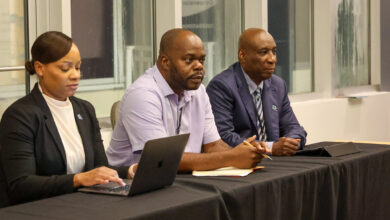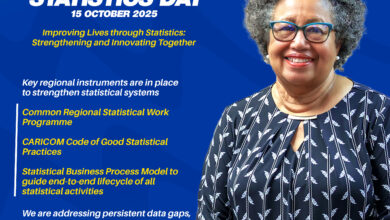H.E. Felipe Caldeŕon, President of Mexico
H.E. Luisa Diogo, Prime Minister of Mozambique
H.E. José Rodríguez Zapatero, Prime Minister of Spain
Dr Pedro Cahan, President of the International AIDS Society and International Conference Co-Chair
Dr Luis Ramirez, Local Conference Co-Chair
Distinguished Ladies and Gentlemen
It is a profound honour and pleasure for me to be part of this momentous occasion here in Mexico City, and to share this platform with such distinguished World Leaders and, in particular, to associate myself with the hopes and aspirations of the members of the various delegations, especially persons living with HIV and AIDS. I hope that this Seventeenth International AIDS Conference will be a significant landmark in charting the way forward in achieving its objective – Universal Access Now.
There is no better location to concentrate this attack on HIV/AIDS than Mexico – a country which emerged out of the political struggles for independence from Spain over 187 years ago and built on the foundations of the Mayas and Aztecs, a highly developed civilization and a vibrant economic, social and cultural system so admired by the Caribbean Region.
There is no country more fitting to host a meeting on Universal Access Now than Mexico, because Mexico has demonstrated to the World, through its health reform programme, the inextricable link between health and development. The current health system of Mexico is structured on a new formula of health financing designed to reduce the burdens on the poor and vulnerable groups. It is complemented by a health insurance scheme that provides for universal coverage for AIDS treatment, among others. It has created a separate fund for community health services and embarked upon unprecedented efforts to strengthen health-related public goods such as epidemiological surveillance, environmental health, regulations to protect the public and intersectoral interventions that define health policies capable of modifying the social determinants of diseases such as HIV and AIDS.
I take this opportunity to congratulate you, Mr. President, for the model and leadership in health and HIV/AIDS that Mexico presents to the World by laying such a solid foundation on which to launch the imperatives of Universal Access Now for HIV/AIDS prevention, care and treatment.
I wish also to acknowledge the bonds of friendship and goodwill established between Mexico and the Caribbean Community in trade, education, health, culture and, more recently, climate change, and for your leadership on behalf of Latin America and the Caribbean Region on the Board of the Global Fund for HIV/AIDS, Malaria and Tuberculosis.
I speak to you on behalf of a Region that has taken extraordinary steps to establish a viable structure to fight HIV/AIDS. I speak to you as Chairman of the Pan-Caribbean Partnership against HIV/AIDS (PANCAP), a unique multi-country network with membership stretching from Belize, The Bahamas and Cuba in the North, through Haiti, the Dominican Republic, the Leeward and Windward Islands and the Dutch, French and English territories, down to Guyana and Suriname in the South: a network comprising governments, non-governmental organizations, the private sector, media broadcasters, faith-based organizations and development partners. A network that has been acclaimed an international best practice by UNAIDS and which is leading the Pan-Caribbean response by mobilizing resources, advocating the placing of AIDS high on the national and regional agendas and forging synergies in strengthening the public health response. The Caribbean is inviting the World Community to use PANCAP as a resource and a tool for the establishment of future regional partnerships to address challenges posed by HIV/AIDS.
Many successes have been achieved in individual Caribbean countries in areas such as care, treatment and the prevention of mother-to-child transmission of HIV. However, as a Region, there is no certainty that we will achieve Universal Access goals if we continue to do business as usual. Understanding that fact, PANCAP is starting a major advocacy activity in close collaboration with UNAIDS and its co-sponsors. This will involve the use of available information to support countries using evidence-based research to implement action in a national context where human rights are respected and promoted, stigma and discrimination are dramatically reduced and most-at-risk populations are the priority targets of HIV prevention programmes.
We fully recognize that one of the social determinants of health is the creation and diffusion of knowledge. We also recognize the critical involvement of people living with HIV in shaping and spearheading the response. Our experience in the Caribbean is adequate testimony to the need for building and sustaining partnerships to scale-up interventions and move towards Universal Access targets. We take the opportunity of this 17th IAS to further reach out to the International Community gathered here in Mexico in the refrain of that celebrated global chorus “reach out and touch” or as our own Bob Marley would say “Let’s get together and be all right”. Universal access now requires Global Partnerships.
Global Partnerships require us to appeal to you gathered here to join in our struggle to reform the philosophy and practice of our multilateral agencies and the Global Fund that impose unrealistic barriers on middle-income countries without taking into consideration the peculiar circumstances of a Region like ours which is fashioning a CARICOM Single Market and Economy, specifically to achieve a measure of competitiveness as a “collective” of 15 States and a population of approximately 16M within the global community.
We publicly acknowledge the sensitivity displayed by the US Presidential Emergency Fund for HIV/AIDS Response in broadening its support to the entire Caribbean Community and to our PANCAP members. We know that the AIDS epidemic is far from over. It requires evidence-based interventions and sustained long-term commitment and support. Therefore, the Caribbean is asking the International Community to commit itself to that long-term support which will consolidate gains made and broaden successes accomplished.
I also wish to take this opportunity to commend UNAIDS for its continued leadership, especially in the movement toward Universal Access and generally for its guidance and direction which has sustained global partnerships around agreed principles. The recent production and launching of the very informative UNAIDS Report on the Global HIV/AIDS Epidemic is one of many initiatives of UNAIDS. In this regard, permit me, on behalf of the Caribbean Community and the Pan-Caribbean Partnership, to pay tribute to a man whose outstanding leadership and commitment to the cause of HIV/AIDS and who is no doubt one of the reasons why, at this 17th IAS, I could stand here and say with confidence that we are on our way to declaring victory through Universal Access. I refer to none other than Dr Peter Piot, Executive Director of UNAIDS.
I also wish to recognize the bonds of friendship that have been recently consolidated during the ongoing Trade and Cultural Exposition 2008 in Zaragoza, Spain and in particular the role played by Prime Minister Zapatero in honouring the Caribbean by dedicating 14 August 2008 as CARICOM Day in Spain, thereby highlighting the achievements of our emerging integration machinery – the CARICOM Single Market and Economy. That you are here along with Prime Minister Diogo of Mozambique who is a firm advocate for the reduction of stigma and discrimination against PLWA is further testimony that this 17th IAS fully endorses the value of international partnerships in achieving Universal Access Now.
In July of last year, in Brazil, Peter Piot warned “The world must accept the exceptionalism of AIDS. There is simply no precedent in the history for such a crisis. And please let’s not have an illusion that in a few years, one fine day, the world will return to what it was before AIDS. No. AIDS has simply rewritten the rules. And to prevail, we too must rewrite these rules. An exceptional threat demands exceptional action.” We must adhere to this injunction and redouble our efforts.
Chairman, Ladies and Gentlemen, let us use this Conference to remember and celebrate the role of our heroes in this struggle against HIV/AIDS. Let us, too, recognize our collective responsibility to build on the foundations of our heroes. In the words of Martin Luther King (1968):
“It really boils down to this: All life is interrelated. We are all caught in an inescapable network of mutuality, tied into a single garment of destiny, what ever affects one directly, affects all indirectly”
Herein lies the essence of fostering and strengthening the global partnership which this Conference in Mexico offers. It is undoubtedly the most sustainable approach to achieving Universal Access Now.





